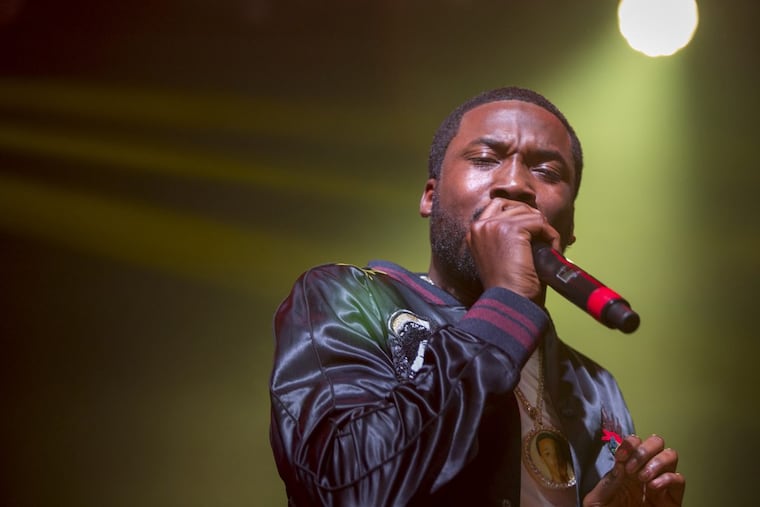Meek Mill, freed from prison, has his biggest audience ever
Now that he's out of jail, Meek Mill will be bigger than ever.

It's not hard to find examples of rappers who have spent time behind bars and emerged with their careers intact.
In fact, it's a time-honored tradition in a genre in which authentic experience on the streets is prized. Tupac Shakur released the most popular albums of his career after serving eight months for sexual assault in 1995, and Gucci Mane topped the charts this year after spending five months in lockup in 2017.
But no rapper has ever gone to jail and come out transformed like Meek Mill.
The Philadelphia street rhymer, born Robert Rihmeek Williams, was released on bail on Tuesday afternoon when the Pennsylvania Supreme Court offered him "extraordinary relief" because of questions about the credibility of a witness in Mill's drugs and firearms case, which dates back to 2008.
In the 5½ months since Mill was put back in prison for parole violations, Mill has become an international cause célèbre and a symbol in the fight for criminal justice reform and against unequal justice for African Americans and other minorities.
To say that the hip-hop community has rallied around him would be an understatement, from entertainment kingpin Jay-Z, whose Roc Nation company manages Mill, to Canadian superstar Drake, who famously beefed with the Philadelphia rapper in 2015. Since November, there have been three hashtagged words everyone in the usually contentious hip-hop community could agree on: #FreeMeekMill.
And of course, Mill's status as a symbol of injustice grew far beyond the longtime loyalists whom he gratefully shouted out as "Day Ones" during last July's show intimate show at the Fillmore in Philadelphia when he couldn't have imagined the troubles that lie ahead.
While he was serving time in the State Correctional Institute in Chester, Mill was beneficiary of the unflagging support of Sixers co-owner Michael Rubin, who along with Jay-Z's Roc Nation, funded the Stand with Meek Mill campaign, whose message was emblazoned on buses and newsstands throughout the city.
Mill's incarceration and the movement to work toward his release has also, fortunately for him, coincided with the rise of the Philadelphia sports teams on the national stage.
The Eagles made their entrance to "Dreams & Nightmares," Mill's defiant going-into-battle song that's the title cut to his 2012 album, as they went on the field on their way to winning the Super Bowl in Minnesota in February. The ascendant Philadelphia 76ers, whose pregame faux Liberty Bell Mill was expected to ring on Wednesday during Game 5 of their playoff series against the Miami Heat on Tuesday, take the court to the fired-up strains of "Dreams & Nightmares" at all their home games. And perhaps the best example of how worldwide Mill's fame has become during his incarceration came in February, when Slovenian snowboarder Tit Stante while competing in the Winter Olympics in South Korea, revealed a message to the world scrawled on the bottom of his board: #FreeMeekMill.
What all this means is that Meek Mill potentially has a much bigger audience waiting for him now that he's out than he did when he went in. In a million years, no one would have planned getting a 2- to 4-year sentence as a career strategy, but it's potentially worked wonders for the rapper's relevance.
Last year, Mill released Wins & Losses, his third official full-length album (he's also released many mixtapes); its gritty raps and trademark seriousness saved his career. After losing out in his aforementioned battle of insults with Drake and breaking up with his rap star girlfriend, Nicki Minaj, Mill was in danger of being seen as a defeated sad sack.
But not long after he got that W, Mill was dealt the much more severe L when he was sentenced to prison.
While his supporters were rallying behind him, Mill, who records for Atlantic Records, tended to his career as best they could. In February, a vocal recorded before he went in prison was featured on a remix Detroit emcee Tee Grizzley's song "First Day Out." And earlier this month, a Spike Jordan-directed video for Wins & Losses' "1942 Flows" came out showing Mill in a reflective mood interspersed with clips from "Free Meek Mill" rallies.
And now, he has been freed, on bail at least, and presumably a new trial awaiting him. Other than the potentially enormous new audience, he's also presented with an enormous new opportunity. What Mill's advocates, including Jay-Z in a piece he wrote for the New York Times' op-ed page, stressed throughout Mill's incarceration, was that the rapper's cause was being championed not just because he was a talented celebrity, but because his case was illustrative of a deeply flawed justice system.
Mill alluded to that himself in one of his initial tweets upon the announce of his release, when he thanked the Philadelphia District Attorney's Office and wrote: "I'm grateful for your commitment to justice. I understand that many people of color across the country don't have that luxury and I plan to use my platform to shine a light on those issues."
Mill is a much more significant cultural figure now than he was 5½ months ago. And now that he's out, he'll need something to do with himself and a platform to do it on. Last year, one of the highlights of the annual Made in America festival on the Benjamin Franklin Parkway was when Mill came out as a surprise guest at the close of festival head Jay-Z's closing set.
The lineup for this year's Made in America has not yet been announced. But surely there couldn't be a more ideally suited headliner than the hometown hero rapper with a story to tell and message to convey to his people gathered on the streets where he grew up.